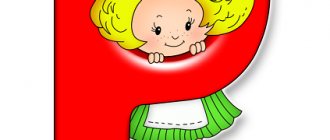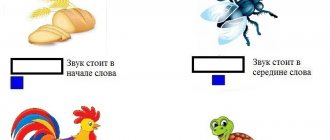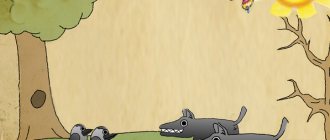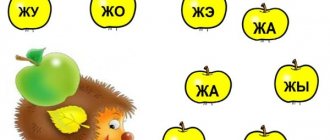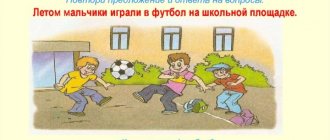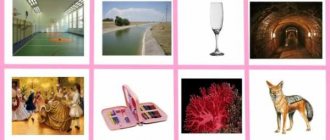The sound “L” is one of those sounds that children master quite late. The optimal age for its placement is 5-6.5 years. In addition, it often happens that without special help, a child is unable to develop the correct pronunciation skill for a given letter. Automating the “L” sound will help reinforce correct pronunciation.
Why is pronunciation impaired?
Before voicing the reasons why the “L” sound is violated, we should talk about the errors themselves, what they are. The most common violations are:
- The child cannot pronounce this letter at all.
- The baby distorts the sound because he uses the wrong location of the organs of the speech apparatus when playing.
- The baby replaces “L” with other sounds.
Pronunciation is impaired due to reasons such as:
- Presence of a short hypoglossal ligament.
- Weakness of the muscle tissue of the tongue.
- Failure of phonemic perception of sound in the speech process.
In order to correct incorrect sound reproduction, it is necessary to regularly engage in articulatory gymnastics and special speech therapy exercises designed for sound automation. This can be done either at home with parents or with a speech therapist.
Pure sayings starting with the letter L
La-la-la - here's the saw.
Loy-loy-loy – we cut with a saw. Ly-ly-ly - there’s no saw. Lu-lu-lu - the saw was broken. Lu-lu-lu - we bought a new saw. Lu-lu-lu - Tolya sharpened his saw Li-li-li - salty soup, at Ilya's!
Li-li-li, li-li-li - poplars are visible in the distance. Le-le-le, le-le-le - we have a lot of them in our village. La-la-la, la-la-la - but they make the earth go down. La-la-la, la-la-la - we all love poplars. Lu-lu-lu, lu-lu-lu - I love poplars too.
Lo-lo-lo – it’s warm outside. Lu-lu-lu - the table is in the corner. Ul-ul-ul- our chair broke Ol-ol-ol - we bought salt. Lu-ru-lu - the janitor took a broom. La-ra-la - here is the car. La-la-la - that's a spinning top. Lu-lu-lu - they gave me a spinning top La-la-la - the spinning top is spinning. Loy-loy-loy - I love playing with the top
In a meadow under a burdock tree a frog has a summer house, and in a frog swamp she has a large dacha.
The husky and lapdog barked loudly. The Oriole sang for a long time over the Volga.
Articulation classes
Before proceeding directly to fixing the sound, it is necessary to prepare the organs of the speech apparatus. To do this, it is recommended to perform several exercises from articulatory gymnastics. They perfectly warm up and strengthen the muscles necessary for sound pronunciation, so the time for sound automation will be significantly reduced.
"Swing"
The objective of this lesson is to develop the skill of holding and changing the position of certain articulatory positions. To perform this, you should smile, open your mouth, tense your tongue and pull it towards your nose, and then towards your chin. At first, such a swing should swing quickly, and then the pace should gradually slow down. In this case, you need to try to fix the tongue at the top or bottom for a few seconds.
During execution, you need to ensure that only the tongue moves. It is often found that a child does this exercise by placing the speech organ on the lower lip. As a result, only the lower jaw functions, and the tongue does not work. This leads to the ineffectiveness of the exercise, so this should not be allowed.
"Horse"
The purpose of this exercise is to strengthen the upward movement of the tongue, stretching the ligament under the tongue. It must be done as follows: smile, open your mouth wide, apply a wide tongue to the palate located at the top, and then lower the speech organ down. You need to start the lesson slowly. The speed can only be increased as you improve this exercise.
If the exercise is performed correctly, a sound will be heard that resembles the clatter of horse hooves. During training, you need to make sure that your mouth is open wide throughout the entire session, and that your lower teeth do not move at all. If you have difficulty holding the lower jaw, you must hold it with your hand for the first time.
"Fungus"
This exercise is performed in order to consolidate the upward movement of the tongue, as well as to acquire the skill of holding a certain location of the speech organs, and to stretch the frenulum located under the tongue. The child will need to smile, open his mouth wide, put his wide tongue to the roof of his mouth and fix this position as much as possible. The exercise should be done with the mouth wide open, and the lower teeth should remain motionless.
Having carried out such simple articulatory gymnastics, the baby will prepare the muscle tissue of his speech apparatus and will be able to more easily perform exercises to automate the required sound.
Options for tasks and games with tongue twisters using the sound L for children
— Game “From Turtle to Rocket”, “Radio” - for a description of the games, see the article “Automation of sound R: games and tasks for children”
- Find words in the tongue twister with the sound L and with the sound L.
- Find words in a tongue twister in which the sound L (or the sound L) is at the beginning of the word, in the middle of the word, at the end of the word.
- Come up with your own funny sentence with this word (fable - confusion).
- Which word got lost? (The adult replaces the word from the tongue twister with another word that is inappropriate in meaning, the children guess which word got lost and which word needs to be put in the tongue twister).
- Take two words with the sound L from the tongue twister and combine them into one sentence.
- Say a tongue twister cheerfully, sadly, amazed, admiringly, tiredly and with other intonations. You can play “Tell me like me” - the child repeats the intonation, pauses of the host - the adult in pronouncing the tongue twister.
- Guess the intonation with which your playing partner pronounced the tongue twister.
— The correct way to say a tongue twister out loud is first slowly (this is how Tortilla the turtle would say it), then at an average pace (this is how Artemon would say it), then quickly and quickly (this is how Toropyzhka says tongue twisters).
- Catch the ball from the leader and, in response, repeat the tongue twister and throw the ball further either to the leader or to the next child.
Games to improve pronunciation
It is best if the automation of the “L” sound in words and sentences is carried out in a playful way. After all, a small child needs to be interested, and the usual repetition of syllables, words, phrases is very tiring and boring for him.
You can conduct classes using a variety of pictures that depict objects or animals whose names contain the letter “L”. You need to arrange the drawings in three rows and ask the child to name the images from the top, then the middle and bottom rows.
Then you need to lay out five pictures on the table and give the child time to memorize them. Then close them and tell the child to name the drawings from memory in the order in which they were laid out. Then you need to replace some card and ask the child to say what was added.
You can also play by ear. The parent needs to name three words with the letter “L”, and the baby needs to remember and name them. You can use the same words each time, but be sure to change their order. This exercise will help not only consolidate pronunciation, but develop auditory perception and memory.
The next game is aimed at helping the child learn to form nouns with diminutive suffixes. The parent names the word, and the baby comes up with a pet word. For example, a doll is a doll, an elephant is an elephant, a dress is a dress, an apple is an apple, a heel is a heel, a puddle is a puddle, and so on.
Sound automation [L]
- Speech therapist.No
- Automation of sounds
- Sound automation [L]
The hard consonant sound [L] is colored blue (hard consonant). Vowel sounds are colored red.
The sound [L_] is pronounced for a long time and only with a motionless tongue (see articulation of the sound [L]).
1) Pronounce (read) syllables with the sound [L_]
Sample: al__, ol__, st__, yl__, el__, il__, el__, yol__, yul__, yal__
2) Pronounce (read) words with the sound [L] at the end
Sample: floor__, y-goal__
|
|
|
|
|
3) Pronounce (read) words with the sound [l] in the middle
Sample: floor, and head
|
|
|
|
4) Pronounce (read) the syllables L__A, A__O, L__U, L__Y, L__E
5) Pronounce (read) words with the sound [L] at the beginning
Sample: l__ak, l__a-pa
|
|
|
|
|
6) Pronounce (read) words with the sound [l] in the middle
Sample: ka-l__ach, sa-l__at
|
|
|
|
7) Pronounce (read) syllables
Sample: k-l__a, k-l__o, k-l__u, k-l__y
|
|
 Pronounce (read) words with a combination of consonants with the sound [L]
Pronounce (read) words with a combination of consonants with the sound [L]
Sample: f-l__ag, p-l__a-val__
|
|
|
|
9) Pronounce (read) words with two sounds [l]
Sample: f-l__ag, p-l__a-val__
|
|
|
|
10) Pronounce (read) phrases
Sample: SAMPLE: White ha-l__at
- Blue dress.
- Bright moon.
- Bad boat.
- Yellow scarf.
- Broken saw.
- Cold basement.
- Hungry wolf.
- Thick stick.
- Heavy hammer.
- Ripe strawberries.
- A warm coat.
- A spiky tree.
- Tin soldier.
- Golden ear.
- Blue eyes.
- Silk blouse.
- Deep well.
11) Conjugate sentences
- I ate milk noodles.
- I bought a notepad and chalk.
- I broke my bike.
- I was sailing on a boat on the waves.
- I ate ripe strawberries.
Sample:
- I drank cold milk.
- You drank cold milk.
- He (she) drank cold milk.
- We drank cold milk.
- You drank cold milk.
- They drank cold milk.
12) Say (read) sentences
Sample: Mi-l__a pi-l__a mo-l__o-ko
- There was a table next to the table.
- Volodya went to the collective farm.
- Alla bought a white dress.
- Mila carried the blue flag.
- A boat floats on the waves.
- Klava clapped her hands.
- Klusha swept the floor.
- The elephant has white tusks.
- The squirrel was sitting near the hollow.
- Klava bought onions and beets.
- Mila ate strawberries from a basket.
- Nikolai broke his bike.
- Volodya forgot where he put his pencil case.
13) Pronounce (read) pure sayings
- He sat down and ate everything.
- Near the bell stake.
- Klava deftly chopped the onion.
- Mom didn’t spare soap; mom washed Mila with soap.
- The stake is near the table, the table is near the stake.
- Polkan pushed the stick with his paw.
- Alyonka sat down in the corner - Alyonka had a lot to do.
- The nightingale is not great, but its voice is golden.
- Put off idleness, but don’t put off doing things.
- A cap under a cap, a cap under a cap.
- Here the cheerful bun rolled like a ball.
- Fyokla’s beets were wet and dry.
- Slava swam on a raft and caught roaches from the raft.
14) Pronounce (read) and retell the text
Naughty
Mila had a cat. He was completely white. Mila named him Belyak. Belyak was a big naughty man. One day Mom was knitting new socks for Mila. There was a ball on the table. Mom left the room and left the ball on the table. The white hare jumps onto the chair, from the chair onto the table, and let’s push the ball with his paws. The hare pushed and pushed the ball and tangled all the threads. Mila entered the room, saw a ball on the floor and said: “Oh, what a naughty man you are, Belyak!”
15) Say (read) poems
White snow, white chalk, The white hare is also white. But the squirrel is not white, the squirrel was not white.
Grandfather planted onions and grew an onion. The grandson saw the bow and tore off the forelock of the bow.
Klava deftly chopped onions, Lala washed the floor and shelves, Volodya knocked out the dust, Valya hammered nails, Kolya merrily sawed, Anatoly washed the forks, and little Sveta ate sweet candies.
- White hare, white hare! Where did you run after the bast? The white hare answered: “I didn’t run, I galloped.”
16) Pronounce (read) and memorize a poem
Clown weirdo
The weirdo clown did everything wrong: He dug with a crowbar, broke with a shovel. He sewed with a chisel and chiseled with a needle. He sawed with a cleaver, stabbed with a saw. I used a broom to whitewash and chalk with a brush.

